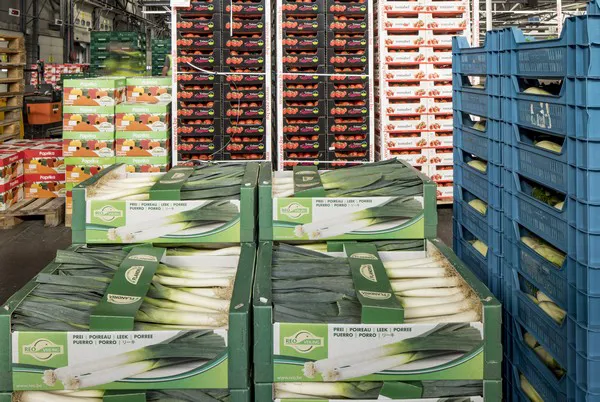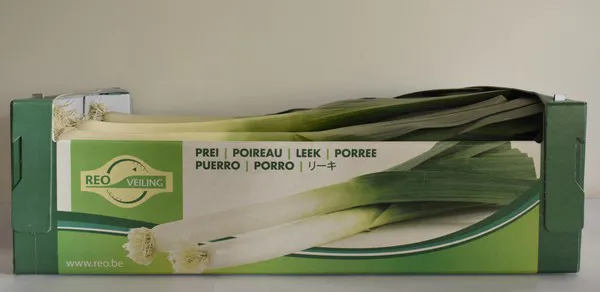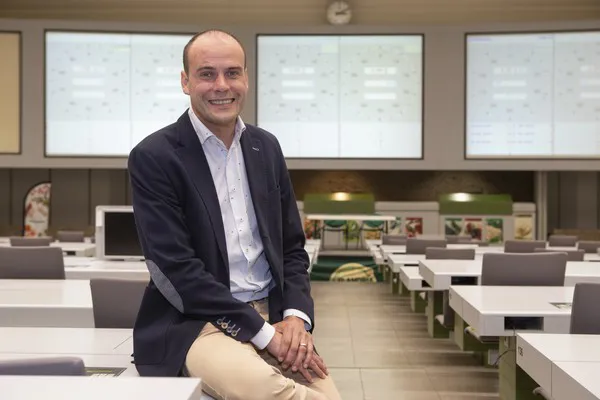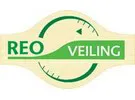In Belgium, there are factors hindering the production of fresh fruit and vegetables. Growers have to make strategic, operational choices and thus postpone or slow down their cultivation, innovations, and investments. That, and certainly the weather, means the Belgian cooperative REO Veilig is receiving a smaller volume of winter vegetables. "Eventually, these hurdles will be overcome. Resilience, work ethic and flexibility are simply part of our DNA," begins commercial director Dominiek Keersebilck.
REO Veiling's winter season is hobbling along, and after an uncertain, difficult 2022, everyone is eager to return to normalcy. "Several factors and circumstances are causing issues. High inflation, the rampant energy crisis, the war in Ukraine, the limited availability of raw materials resulting in high packaging prices, the tough economic climate with declining purchasing power, the nitrogen issue, MAP7, the list goes on and on." These difficulties are adversely affecting Flemish horticultural companies' productivity and profitability.
 REO Veiling is receiving smaller supply volumes of winter vegetables.
REO Veiling is receiving smaller supply volumes of winter vegetables.
"An estimated 17% fewer vegetables are being cultivated overall for the Belgian fresh market. That’s true for most all winter vegetables sold to end customers via REO Veiling. Last summer's heat and drought add to that. Growers were sometimes not allowed to irrigate, and those effects are being felt in current harvest volumes. There are significantly fewer cabbages, celeriacs, and leeks," says Dominiek.
In 2022, REO Veiling sold almost 48,000 tons of leeks. This year, however, there will be fewer yields per hectare. "Will a smaller supply in a supply/demand-driven sales market benefit prices? It may well lead to higher auction prices. But that doesn't automatically translate into higher grower returns. Seed, planting material, crop protection, and other production necessities are certainly more expensive. The same goes for, for example, labor costs. Profit margins remain very much under pressure."
Passionate about the product
REO Veiling sells only its affiliated growers' leeks, some via auction. "Temperatures fell to -7°C in December and then were quite high in early January. That's making it tremendously challenging for our member producers to deliver quality winter vegetables. And yet they manage to do so every day. We want our products to always have the same quality on store shelves," Dominiek explains.
"It's good to see that REO Veiling is recognized as a reliable chain partner, and we thank all our business partners for their confidence in us. It's fantastic motivation to keep working with the same drive this year and to get the right product to the right customer. We're currently exploring the possibilities for differentiation in retail sales, like auctioning leeks per piece."

According to Dominiek, given current market conditions, it is equally hard to be a top-quality, solutions-orientated trading partner. "Research shows that from February to October 2022, stores sold six percent fewer fresh fruits and vegetables. Products are now even pricier, something we don't see changing any time soon. Price increases are real, but also necessary throughout the chain if everyone in it wants to keep producing fresh fruit and vegetables profitably," he says.
REO Veiling obviously wants to get the best from the market for its 800 active affiliated producers. They are expecting this number to decline in the coming years. "This doesn't necessarily go hand in hand with an acreage shrinkage. Scale economies at the farm level will continue, except if certain political proposals are adopted. Then it could just as easily go in a different direction." REO Veiling's commercial director is referring to the nitrogen debate proposals to stop harvesting open-field vegetables after September 1. "For leeks, celeriac, and Brussels sprouts alone, this would amount to 30 to 40% fewer sales for REO Veiling and its producers."
"Flemish horticulture has everything it needs to keep succeeding locally and abroad. If we want to maintain that, all chain partners must work closely together. And we need a supportive government that ensures local anchoring and doesn't undermine the continuity of the entire food chain. Otherwise, Flanders risks becoming dependent on foreign countries for not only its energy but its food production too. Nobody wants this, right? For 2023, I, therefore, wish everyone common sense, social awareness, and a constructive policy that turns challenges into opportunities. Because we desperately need that," says Keersebilck.
Confidence in the future
But, no matter how challenging conditions may be, he remains optimistic. "Resilience, work ethic, and flexibility are ingrained in REO Veiling and its member growers. The past proves those growers are quick to adapt to change. The same goes for their companies. Much is expected of them now, but I'm confident that, eventually, these hurdles will be overcome. That may not apply to every Flemish horticultural company. Still, I'm certain our region has enough potential for a positive, sustainable future with fruit and vegetables that meet the current fresh produce market's social standards and values," Dominiek concludes.
 Dominiek: "These hurdles will eventually be overcome. Resilience, work ethic and flexibility have become part of our DNA."
Dominiek: "These hurdles will eventually be overcome. Resilience, work ethic and flexibility have become part of our DNA."
For more information:  REO Veiling
REO Veiling
Oostnieuwkerksesteenweg 101
8800 Roeselare, België
+32 (0)51 23 12 11 I
info@reo.be
www.finefleur.be
